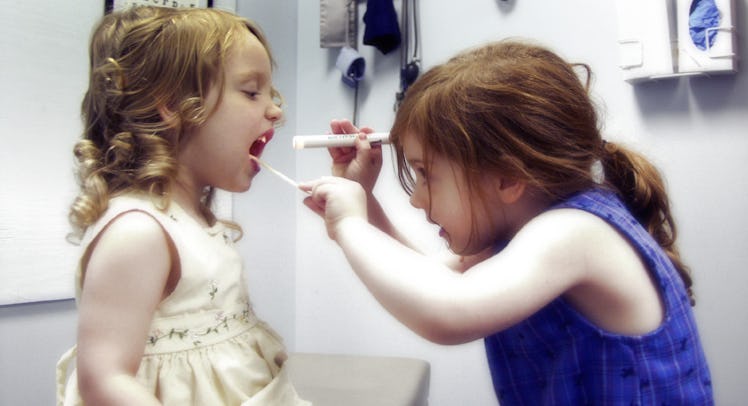When ‘Playing Doctor’ Requires A Diagnosis
For kids, the penis and the vulva are just curiosities.

Putting a name to it — “experimenting” or “playing doctor” — doesn’t make the experience of happening on a young child showing another young child their genitals less shocking. The sudden exposure to child nudity is a surprise, sure, but then there’s the panic around sexuality and the generalized cultural nervousness about private parts. As if that weren’t enough, there’s often another parent involved and inevitably that parent has the opposite reaction to the biggest little reveal. It’s a lot to handle but, fortunately, the current scholarly advice on handling show and tell is very simple and easy to remember: Turn around and walk away.
“This is a matter of curiosity,” says Deborah Roffman author of Sex & Sensibility: The Thinking Parent’s Guide to Talking Sense About Sex. “If they were looking inside each other’s mouths and making comparisons, we’d say ‘Oh, Isn’t that cute!’”
But parents get jumpy when it comes to genitals. That’s because adults are cursed by an understanding that sometimes a pipe is just a pipe but a penis is always a penis–and almost always unwelcome at a party. Parents have baggage that children don’t. And the strain of carrying that baggage is exhausting for parent and child, both.
“The most important part is to look at our own reactions and see the double standard that we place around certain kinds of curiosity,” says Roffman. “The point is to treat these parts the same as all others.”
It’s also important to note that non-reaction should be the tactic whether the exploration is happening between same-sex friends or not. The fact is that kids don’t see genitals, much less genitals of the opposite sex, as reproductive organs or vessels of pleasure (at least not for the most part). Pornographic tropes aside, playing doctor is about curiosity and nothing more.
“We make comparisons about things all the time,” says Roffman. “This is how children learn. They are attracted to difference. This is how they expand their understanding of the world.”
And sometimes understanding the world is about touching stuff. This, of course, raises the level of anxiety for parents. But deep breaths are important. This too is innocent. For children, touching and looking are equivalent. It might happen once. It might happen twice, but it’ll probably not become a regular thing unless a child is given reason to believe there’s a significance to that behavior versus, say, touching the bottom of someone’s foot.
“Unless the adult’s reaction gives them some message that they can’t quite grasp yet,” warns Roffman.
The danger of treating the exploration of a penis and a vulva with more interest than is normally mustered for an elbow or an ear is that it could make the kid even more curious, Roffman explains. After all, a kid’s going to want to know why touching that particular spot turns their parent’s face various shades of red. There must be something pretty different about it.
“Then it becomes, ‘I have to find out what this reaction is about,’” says Roffman.
Given all of this, walking away becomes the most logical and empathetic action a parent can choose. However, if they’d like not to have naked friends in the house, there’s an easy way to not shame a kid and keep an even keel by making a rule about keeping clothes on in the house. Then the suggestion to get dressed has nothing to do with their bodies, but the rules.
It’s all about keeping the interests of the child at the forefront. The good news for a parent discovering a kid playing doctor is that they now know their child is curious about genitals. The door is open for an age appropriate discussion. Do they have questions? They obviously do. And you want them to come to you for answers.
There are times to be concerned of course. An older child with a younger child who is less cognitively developed could indicate coercion or pressure. Questions need to be asked. That’s also true if the children are behaving in overtly sexual ways that they would not have understood on their own. Also, while innocent exploration can last until around third grade, things shift in the fourth and fifth and the exploration may be less innocent.
And Roffman hopes that parents can keep themselves level headed. After all, not knowing about all the sexual implications around genitals is a luxury. It’s one of the few luxuries toddlers can afford and their parents cannot.
This article was originally published on